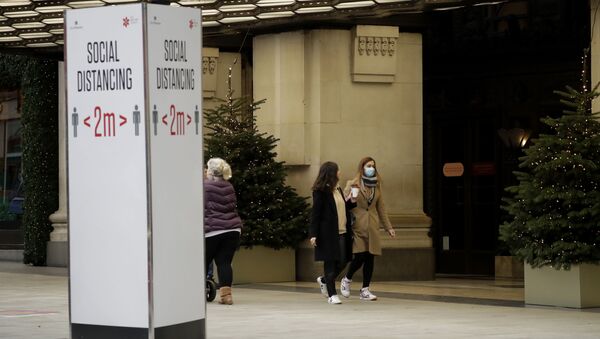Transport Secretary Grant Shapps has announced that people intending to arrive into the UK, will need to take a Covid test up to 72 hours before their departure. Failure to do so will result in an immediate £500 fine.
It is hoped that the new policy, which is already in place throughout many countries across the world, will help contain the spread of the virus.
The government has long faced calls for borders to be strengthened with pre-testing, and many critics have suggested that the disastrous new strain of Covid which is currently destroying the UK could have been avoided if such plans had already been in place.
Robin Tilbrook, Chairman of the English Democrats, shares his thoughts on the new travel restrictions and what it means for the UK in their fight against the pandemic.
Sputnik: So firstly, Robin, what are your thoughts on travellers being banned from entering the UK as of next week, if they do not have a negative Covid test?
Robin Tilbrook: I think the interesting thing is it's taken this government, what's really more than a year since it became clear that there was a problem, to actually do anything useful about trying to regulate people coming into the country who might have a disease. And I do think it's particularly interesting that what we got reported was that back in February, Boris Johnson, and Priti Patel had a row about this. Because Preti Patel was saying, as the Home Secretary that there ought to be some quarantine measures about people coming into the country. And Boris Johnson absolutely refused to do it. And we don't have the figures for all the numbers that have come in over the course of the last year. But I remember the Guardian reported that between the 1st of January, last year and the 23rd of March, when Boris announced his lockdown, that already in that period, over 18, and a half million travellers had come into the country without being checked at all.
Sputnik: Should then this system have been implemented a long time ago? Certainly well before now. Basically, should the UK borders have been closed to help contain the spread of the virus?
Robin Tilbrook: Yeah, so if you look at countries that have got the least numbers, they are in the Western. Australia and New Zealand, both of whom did introduce quarantining measures to stop people coming into the country, and properly spreading the disease. No thought seems to have been given to doing that at all for us. That seems to me to be, you know, on the face of it a gross dereliction of duty. But I do wonder whether there's more to it than meets the eye there. Because I think that actually, if you look at the timeline of what the government was up to, it's clear that they were actually intending to do lockdown, probably right from the start. But the interesting thing is they want to lock us down rather than people coming into the country, which raises all sorts of interesting questions, I think.
Sputnik: Why do you think it has taken so long then for the UK Government to strengthen border measures, with pre-arrival testing? When we've seen this system in place, just as you mentioned, in many countries around the world.
Robin Tilbrook: it's difficult to see any sensible reason, however, I do think we've got good reason to be suspicious about what they're up to. The British government signed up for the largest contract they've ever signed up to for a publicity campaign to manage the publicity around lockdown. And they were already talking in that contract about the slogans that they were going to come up with. The fact is, you know, if you think about public procurement contracts, the timeline of how long that takes. Realistically, though, they were certainly planning lockdown at least two weeks before, so that takes us back to mid-February. In all probability, they were planning it at least six weeks before because that's, more likely the amount of time that a contract negotiation for that kind of money, which is £119 million, that's an enormous amount of money. So that takes us back to mid-January, that they were planning to lock us down and planning their campaign of publicity and how they were going to get us all to obey. And also that the other thing that's interesting about that is, it shows that the row between Boris Johnson and Priti Patel took place after the government had already started to plan lockdown. You know, there is a question here as to why the government was wanting to lockdown the population of our country. You know, as it turns out almost a year before they're actually willing to do anything about doing any lockdown measures on people coming into the country.
Sputnik: What do you think this new lockdown means for the people of the UK? Can another lockdown actually work?
Tilbrook: I'm very sceptical as to whether the lockdown has actually worked anywhere. If you look at different countries that have adopted different measures, including Sweden that did a very limited lockdown. The only countries that's got really different figures are countries as I said are Australia and New Zealand and that's because they've implemented border control, rigorous border controls, but every other country where the diseases got into the country, then the numbers have really very similar in terms of people that are catching it and some people that are also dying from it. And of course, those people that are dying from it partly depend on what proportion of their population is very elderly, because we're still at a point where it is only the very elderly who are really at risk.




